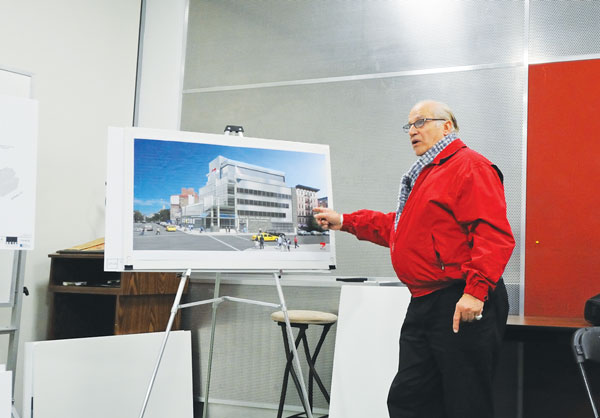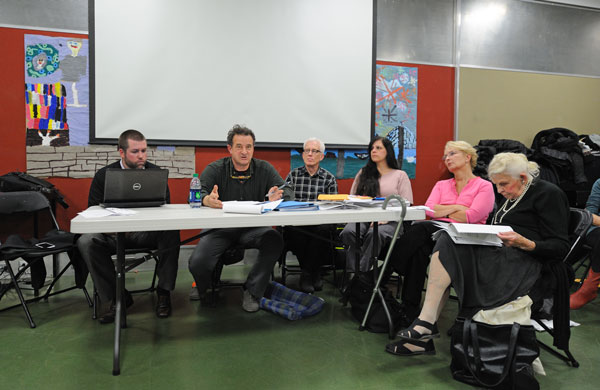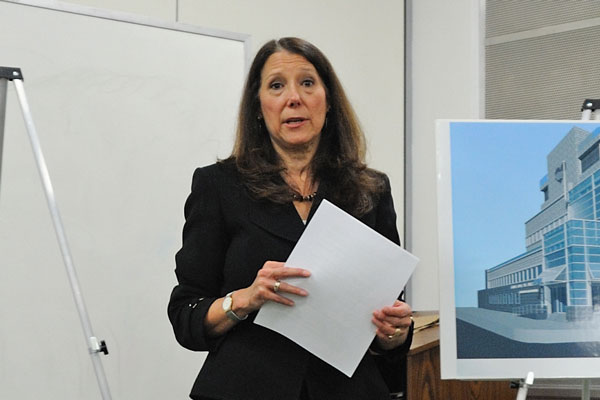
BY TERESE LOEB KREUZER and LINCOLN ANDERSON | Soho neighbors support God’s Love We Deliver’s mission of feeding infirm New Yorkers. But many of them don’t support the organization’s planned vertical expansion — as well as the sale of some of its air rights to a residential project next door to its headquarters at Sixth Ave. and Spring St.
The air rights sale would provide several million dollars to God’s Love We Deliver to help ensure its expansion project has the necessary funds to move forward.
About 100 people turned out on Wed., Nov. 14, at Community Board 2’s Land Use and Business Development Committee meeting at which the complicated, interlocking development arrangement was discussed. Most spoke against the plan.

Albert Podell, a retired lawyer who lives at 110 Sullivan St., testified against the scheme to convey air rights to the proposed residential tower next door, whose residents would also be able to access the G.L.W.D. rooftop, which would fulfill the new residential building’s open-space requirement.
Podell called the God’s Love plan “deceptive” and said he was opposed to it for “moral and procedural” reasons.
Representing God’s Love, attorney Mark Levine of the firm Akerman Senterfitt explained to the C.B. 2 committee members that a developer could construct a 14-story apartment building next to the God’s Love We Deliver building “as of right,” with or without the air rights and without the open-space access on the God’s Love building.
Local resident Richie Gamba — a.k.a. “The Mayor of Spring St.” a.k.a. “Richie Dogs” — objected to the aesthetics of the expansion plan for the God’s Love We Deliver building, which would see the site go from two stories to five stories tall. He said he lived in a 104-year-old building next to the site.
“There’s plenty of room for buildings like that building at the airport,” he said disparagingly of the proposed G.L.W.D. design.

Karen Pearl, president and C.E.O. of God’s Love We Deliver, spoke in favor of the project. She noted that the funds from the air rights sale would go toward helping the organization further its mission of helping feed sick individuals living at home, suffering from H.I.V. and other illnesses. G.L.W.D. is growing and bursting at the seams, largely due to its policy of having no waiting list for its services, she said.
Feeling there were too many unanswered questions about the complex project, the committee decided not to pass a resolution, but instead to lay the issue over until its meeting next month, when it would continue the discussion.
Doris Diether, a committee member, said she had some qualms about the plan.
“The air rights are for a community facility, and they want to transfer it for a residential project — I don’t think that’s legal,” she said.
The G.L.W.D. site carries a deed restriction for community-use facilities that was in place before the organization bought the property at auction from the city.
“My comment was I wouldn’t want someone strange trampling over my roof,” Diether added. “A number of questions came up, and they didn’t answer all of them,” she said of the God’s Love representatives.
“A lot of people from buildings on Sullivan and Prince Sts. are concerned about the impact of the project on their light and air,” said Tobi Bergman, the committee’s chairperson. “There is also concern that the transfer of air rights from the G.L.W.D. building to the residential development violates the 1993 restrictions on the use of the G.L.W.D. property, and that a ‘minor modification’ process does not allow sufficient consideration of actual impact of the proposed change to the restriction.
“There is clearly a lot of respect among committee members and neighbors for G.L.W.D. and an understanding of the importance of its work, but also a sense that the air rights transfer will increase the negative impact of the project on neighbors,” Bergman said. “The committee decided to hold it over until December to give G.L.W.D. and the residential developer time to try to come up with proposals to reduce the impact on the neighbors. This is a very difficult one because there is contradiction between two very important and legitimate sets of concerns.”



































